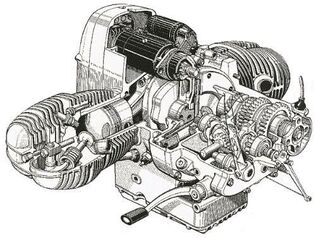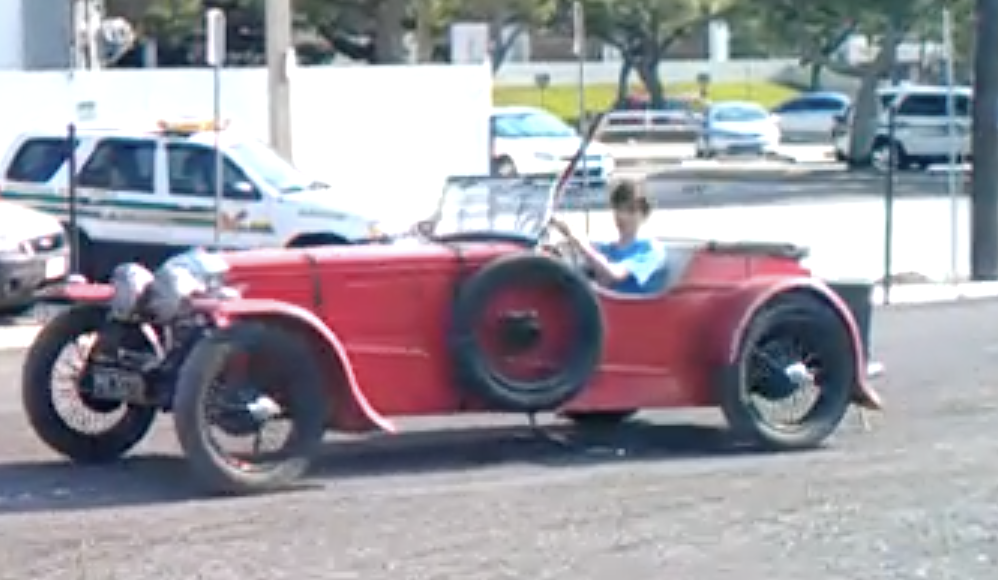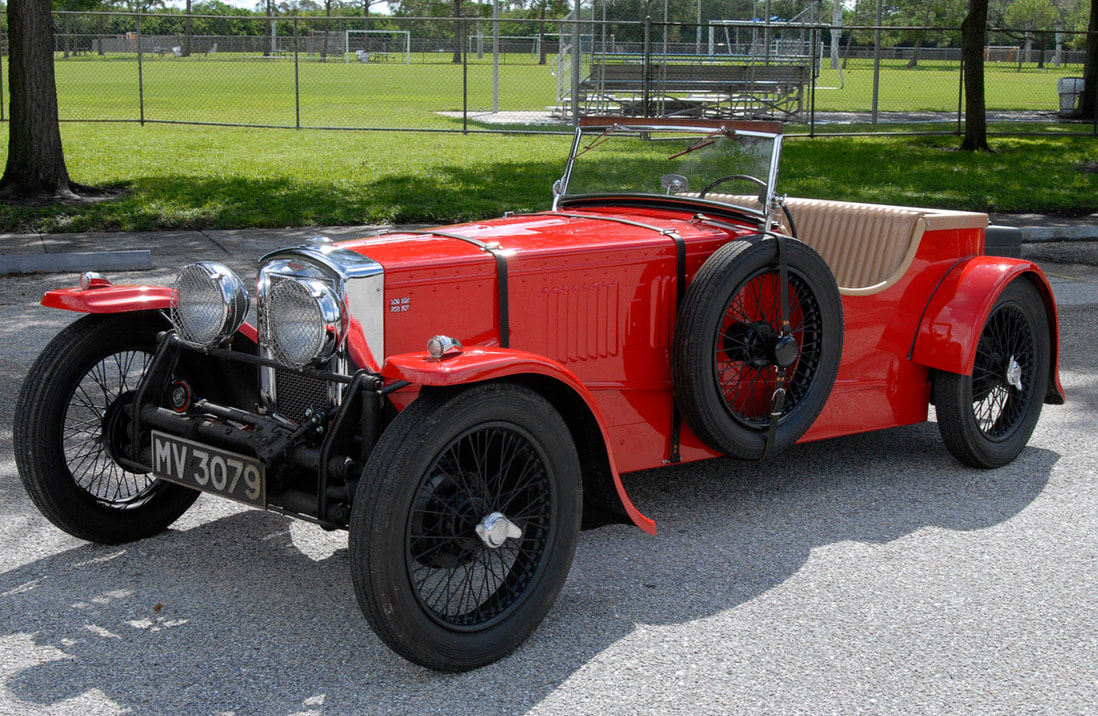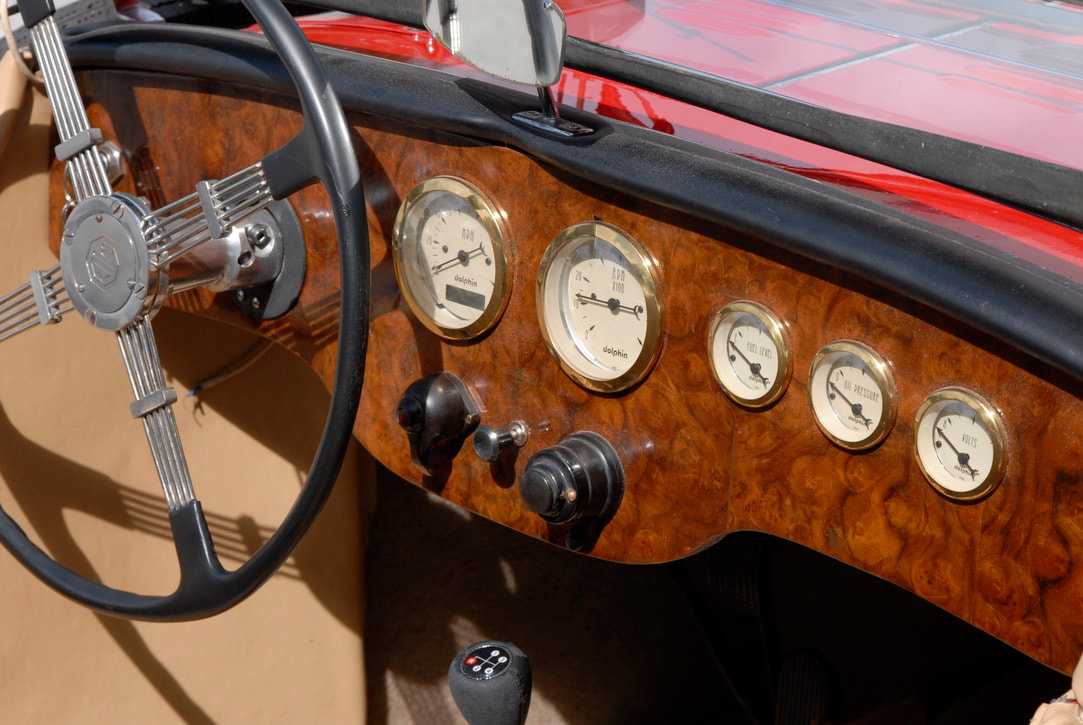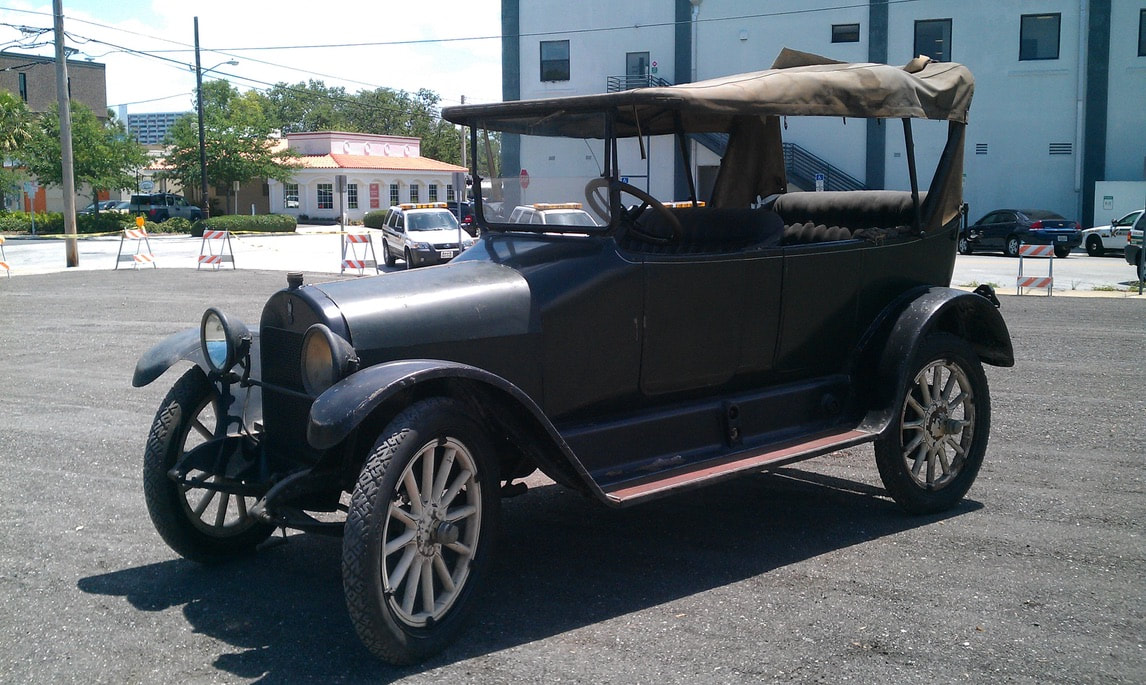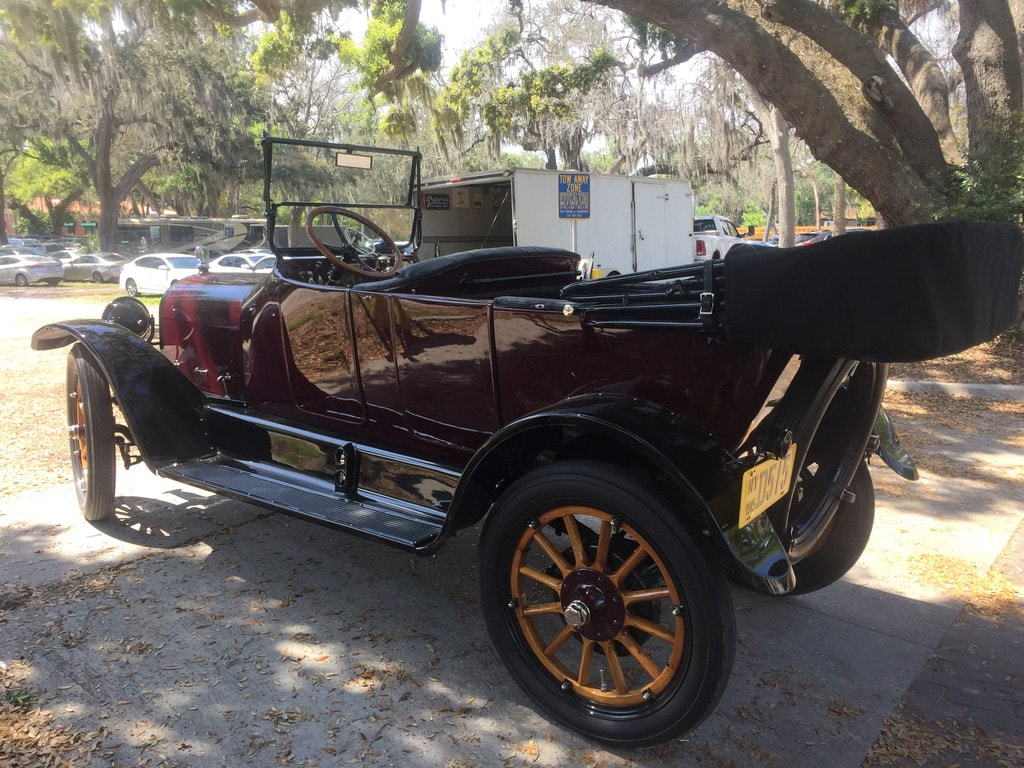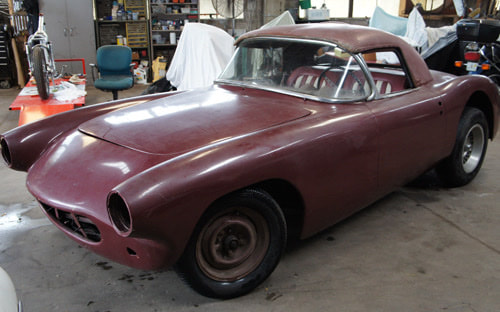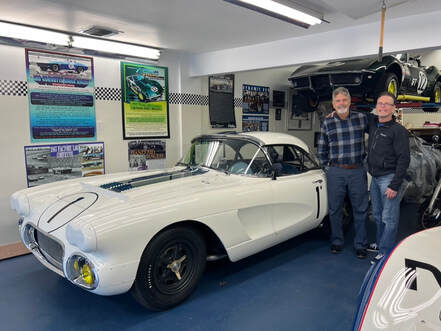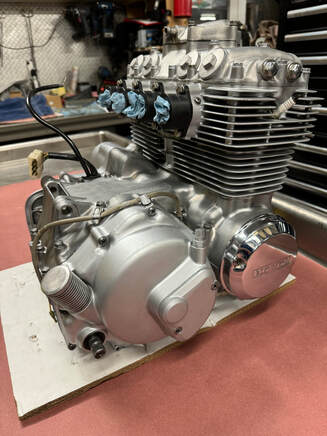Bespoke Motorcycle Restorations
Bespoke - it's a term normally associated with fine men's tailors on Savile Row in London. But, just like a skilled tailor who creates a beautifully-fitted suit, each of our motorcycle restorations is precisely tailored to fit the needs of the customer. Will your restored motorcycle be headed to a museum? Is it a treasured family heirloom? It it an element of a personal collection? Is this bike fulfilling a life long desire? Will this bike be ridden on the road or track? Before we can begin the process of restoration, we have to first determine the needs and budget of the customer. Regardless, no matter what type of restoration we proceed with, it will end up a piece of art, created by a craftsman.
Motorcycle Restoration:
Dreams, frustrations and expectations
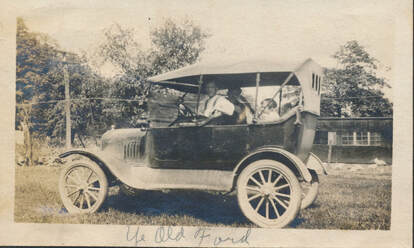 Dad purchased an old 1913 Model-T similar to this one.
Dad purchased an old 1913 Model-T similar to this one.
I began learning valuable lessons about restorations when I just six years old. My father, a man with a wife and four young children (who was also almost always broke), purchased a 1915 Model T on a whim. My mother, I'm sure, had a fit. Somewhere, there are pictures of me with sandpaper in hand, helping Dad remove rust from the fenders of this car. This old Ford remained in my father's possession until the day he died, almost 60 years from when he bought the little black touring car. The restoration never evolved much beyond the condition it was in when he first purchased the vehicle. Rather than being restored to the new condition he must have dreamed of, the car sat for decades, flat tires, metal rusting and the wood eaten away by termites. I'm not even sure the metal fenders I sanded as a boy was ever painted.
After sixty years of observation (many of those years spent digging though old barns and junkyards, going to countless car and motorcycle shows, and hanging out with folks who love and restore antique cars and motorcycles), I've picked up, what I believe to be, a fairly good understanding of the pitfalls and joys that are bestowed upon those who desire to do their own vehicle restorations. I've also learned what it takes to be successful at completing restorations. I'll share some of that wisdom below:
After sixty years of observation (many of those years spent digging though old barns and junkyards, going to countless car and motorcycle shows, and hanging out with folks who love and restore antique cars and motorcycles), I've picked up, what I believe to be, a fairly good understanding of the pitfalls and joys that are bestowed upon those who desire to do their own vehicle restorations. I've also learned what it takes to be successful at completing restorations. I'll share some of that wisdom below:
Observation #1: Very few people have the determination to complete long-term projects.
Life often gets in the way of dreams. It easy to picture yourself riding down the road on that gleaming 1965 Bonneville of your dreams, and it's not too hard to find a vintage Triumph to purchase. But try finding the time to make that ruddy old bike look new again. They come apart fairly quickly, but it may take years to put it back together, if ever. I have finished a bunch of projects other people started: two experimental aircraft, a rare Donzi speedboat, a vintage dune buggy, several vintage cars as well as a whole bunch of antique and vintage motorcycles. People frequently have really good intentions and sometimes excellent mechanical skills, but time is largest impediment to completing a restoration project.
Life often gets in the way of dreams. It easy to picture yourself riding down the road on that gleaming 1965 Bonneville of your dreams, and it's not too hard to find a vintage Triumph to purchase. But try finding the time to make that ruddy old bike look new again. They come apart fairly quickly, but it may take years to put it back together, if ever. I have finished a bunch of projects other people started: two experimental aircraft, a rare Donzi speedboat, a vintage dune buggy, several vintage cars as well as a whole bunch of antique and vintage motorcycles. People frequently have really good intentions and sometimes excellent mechanical skills, but time is largest impediment to completing a restoration project.
It's not just about time. It takes disposable income, a knack for finding those hard-to-find parts and a fair amount of mechanical skill. If you're finding yourself in this situation, you're not alone. A very small percentage of people who start restorations (of any type), have the stick-to-itiveness, the planning, the organization, the financial wherewithal, or the ability to suffer all the abuse that is required to complete a restoration project on their own.
Restoring a vehicle is not something a serial procrastinator should ever attempt. If you are easily frustrated when challenged or if you usually quit rather than fight your way to the finish, restoring vehicles isn't for you, no matter how much you love and desire them. My suggestion, buy the vehicle and hire a professional to restore it. The same goes for anyone who'd rather spend their free time traveling or hanging our with family, rather than working long hours in the garage or basement shop.
As someone who professionally restores motorcycles (I don't do cars, airplanes, houses or boats anymore), any restoration project (even a little Honda CT70) requires a huge commitment of time. I've found, when seeking perfection, almost nothing comes easily. I spend hours on the phone and cruising the internet, looking for information and parts critical to finishing my customer's projects. The time it takes to fabricate parts and perfect paint mounts so rapidly when you're faced with a challenging restoration. So if you don't have a lot of time, you need a professional.
Restoring a vehicle is not something a serial procrastinator should ever attempt. If you are easily frustrated when challenged or if you usually quit rather than fight your way to the finish, restoring vehicles isn't for you, no matter how much you love and desire them. My suggestion, buy the vehicle and hire a professional to restore it. The same goes for anyone who'd rather spend their free time traveling or hanging our with family, rather than working long hours in the garage or basement shop.
As someone who professionally restores motorcycles (I don't do cars, airplanes, houses or boats anymore), any restoration project (even a little Honda CT70) requires a huge commitment of time. I've found, when seeking perfection, almost nothing comes easily. I spend hours on the phone and cruising the internet, looking for information and parts critical to finishing my customer's projects. The time it takes to fabricate parts and perfect paint mounts so rapidly when you're faced with a challenging restoration. So if you don't have a lot of time, you need a professional.
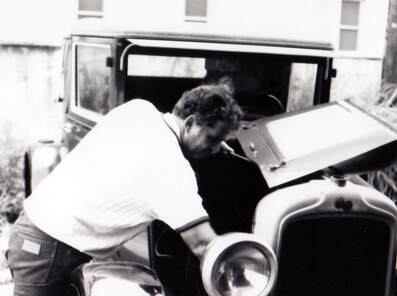 Dad working on his 1928 Pontiac in the mid 1960s
Dad working on his 1928 Pontiac in the mid 1960s
Observation #2: Most people don't have the skills or tools necessary to complete a restoration
Anyone who says you can learn everything you need to know about restorations on YouTube is either ignorant or lying to you. There are at least three projects in my shop at this moment that were begun by "would be" restorers. These good folks dutifully watched dozens of YouTube videos, and attempted disassembly. But after they were slapped in the face with reality, they came to me. Even the simplest task, like disassembly, can frequently frustrate expert mechanics.
To restore a vehicle on your own, you should possess several specific skill sets, the most important being a strong mechanical aptitude. Yes, most people can develop some mechanical abilities over a period of years, but it means being able to suffer though lots of mistakes and the expense that often brings. But just having mechanical ability is nothing without having the right tools and knowing how to use them. I've had engines brought to me with cracked cases because someone attempted to split the cases without removing all the bolts. Yes, there are a lot of hard-to-see bolts holding motorcycle cases together - especially if they're still covered in grease and road dirt.
But it's not just mechanical novices. A professional automotive shop - one that's been around for 30 years - just cost a family member a bunch of money. They wanted to get the brakes fixed on one of my late father's nicest vintage cars, a rare, factory supercharged, 1963 Studebaker Avanti. The mechanic had trouble getting the brake drum off the hub, probably because he didn't have the right puller. So he beat the drum into pieces with a sledge hammer. The car sat months while a brake drum was located and purchased at my family member's expense.
However, simply having a strong mechanical aptitude doesn't mean you will be successful at restoring anything. My father was a pretty good mechanic and he could lay down a decent paint job too. But his greatest strength was his ability to talk to folks, especially those people who had old cars and motorcycles hidden away in their barns and garages. Dad could look at an old barn while driving down the road and just know there was an old car or motorcycle hidden inside. And, he had no qualms about pulling his truck into their driveway, knocking on the door and introducing himself - all the while sporting a huge smile. People liked Dad and a lot of them sold him their old cars and motorcycles to him, usually for a fraction of their future worth. Before he died, he had amassed a multi-million dollar collection of antique cars, motorcycles and memorabilia. Let me be clear: his family never saw those millions. That was dolled out to the folks who bought his cars after he died and then restored them to perfection. To most people peeking though the dilapidated doors of Dad's big warehouse, it looked like a dark cave full of junk. He had probably paid less than $50,000 over his lifetime for all the treasures he had amassed. Dad could squeeze the silver off a dime.
Anyone who says you can learn everything you need to know about restorations on YouTube is either ignorant or lying to you. There are at least three projects in my shop at this moment that were begun by "would be" restorers. These good folks dutifully watched dozens of YouTube videos, and attempted disassembly. But after they were slapped in the face with reality, they came to me. Even the simplest task, like disassembly, can frequently frustrate expert mechanics.
To restore a vehicle on your own, you should possess several specific skill sets, the most important being a strong mechanical aptitude. Yes, most people can develop some mechanical abilities over a period of years, but it means being able to suffer though lots of mistakes and the expense that often brings. But just having mechanical ability is nothing without having the right tools and knowing how to use them. I've had engines brought to me with cracked cases because someone attempted to split the cases without removing all the bolts. Yes, there are a lot of hard-to-see bolts holding motorcycle cases together - especially if they're still covered in grease and road dirt.
But it's not just mechanical novices. A professional automotive shop - one that's been around for 30 years - just cost a family member a bunch of money. They wanted to get the brakes fixed on one of my late father's nicest vintage cars, a rare, factory supercharged, 1963 Studebaker Avanti. The mechanic had trouble getting the brake drum off the hub, probably because he didn't have the right puller. So he beat the drum into pieces with a sledge hammer. The car sat months while a brake drum was located and purchased at my family member's expense.
However, simply having a strong mechanical aptitude doesn't mean you will be successful at restoring anything. My father was a pretty good mechanic and he could lay down a decent paint job too. But his greatest strength was his ability to talk to folks, especially those people who had old cars and motorcycles hidden away in their barns and garages. Dad could look at an old barn while driving down the road and just know there was an old car or motorcycle hidden inside. And, he had no qualms about pulling his truck into their driveway, knocking on the door and introducing himself - all the while sporting a huge smile. People liked Dad and a lot of them sold him their old cars and motorcycles to him, usually for a fraction of their future worth. Before he died, he had amassed a multi-million dollar collection of antique cars, motorcycles and memorabilia. Let me be clear: his family never saw those millions. That was dolled out to the folks who bought his cars after he died and then restored them to perfection. To most people peeking though the dilapidated doors of Dad's big warehouse, it looked like a dark cave full of junk. He had probably paid less than $50,000 over his lifetime for all the treasures he had amassed. Dad could squeeze the silver off a dime.
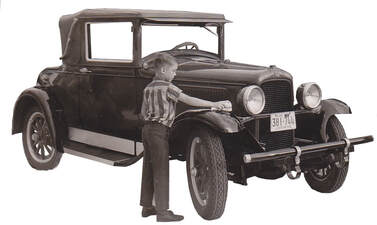 That's me washing Dad's 1928 Pontiac when I was a pre-teen. That was the only restoration completed by my father.
That's me washing Dad's 1928 Pontiac when I was a pre-teen. That was the only restoration completed by my father.
At the time of his death, Dad had about 35 antique cars ranging from a 1912 Indy racer to a fleet of 1960's muscle cars, including one of the most valuable Corvettes in the world (now worth over 6-million), for which he paid the vast some of just two hundred dollars. Although he sold a bunch of antique motorcycles when he first started having symptoms of dementia, he still had about ten antique motorcycles when he died, including a completely original 1915 Indian with a factory sidecar. He paid $2500 for that amazing bike forty years ago. Other than one car I can think of, it was the most he paid for almost any of his collection - cars or motorcycles. Dad's problem wasn't with finding the treasure, or getting it for a good price. It was bringing that treasure back to life. He wanted to and he certainly had dreams of restoring every single car and motorcycle he owned. So many dreams. I heard them all - over and over. Unfortunately, almost none blossomed to fruition. Of the dozens of antique cars and motorcycles he owned during his lifetime, only one I can think of was ever restored by him - a first year, 1928 Pontiac coupe. He did a really nice job and won first place in his class at the Ormond Beach show in the early 1960s. But his inability to finish projects, forged in me a determination to make things whole again. Shortly after he died, I restored several of his projects so my family could see some benefits of his life's work (see the Frazer-Nash photo below). I know that was what he dreamed of. For most folks collecting cars and motorcycles, they find there is much less of a time sacrifice if they send their project to professional. But that brings us to part two and three of the restoration dilemma.
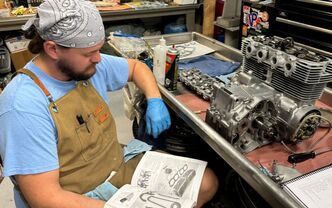 Oliver, learning about the assembly of the CB400F engine. He has the right factory manuals, the right tools and guidance from a "vintage" professional.
Oliver, learning about the assembly of the CB400F engine. He has the right factory manuals, the right tools and guidance from a "vintage" professional.
Observation #3: Not all people who are good at restoring are good at running a restoration shop
There are a lot of folks doing great restorations on motorcycles who are not professionals. In fact, some of the best restorations I've ever seen are by non-professionals. These folks have all the required ingredients for completing a complex re-manufacturing of a motorcycle - time, money and skill. But running a restoration shop requires juggling those ingredients and many more.
Those of us who do this successfully may be doing as many as 10 or more motorcycles at a time for customers (along with our own bikes). So then it becomes a balancing act of moving as far with each project every day as you can, why other projects sit idle, waiting for parts, plating or anything that may be delaying progress. You also have to be able to communicate effectively and in a timely manner with clients. Then, there's managing employees, bookkeeping, time logs for working on each customer's project and good photography to illustrate progress. And that's just the tip of the iceberg. Sure, it's rewarding when you finish a job, but it's also frustrating when there are unexpected delays for any reason.
There are also many mechanical professionals who may be great at working on cars or other vehicles, but not necessarily with antique vehicles. Motorcycles require very specific tools, from smaller sized bearing pullers to tiny piston ring compressors, as well as bigger items like rear shock compressors (with a host of adapters for different motorcycles), and wheel truing stands. We spend a lot of time each year fabricating new tools for the motorcycles we work on. So our advice: if you've decided to pay someone to restore your motorcycle, find someone who specializes in just motorcycles. Even though I'm very experienced in working on antique and vintage cars, experimental aircraft, boats and homes, I have narrowed my professional focus to just one thing - restoring vintage and antique motorcycles.
There are a lot of folks doing great restorations on motorcycles who are not professionals. In fact, some of the best restorations I've ever seen are by non-professionals. These folks have all the required ingredients for completing a complex re-manufacturing of a motorcycle - time, money and skill. But running a restoration shop requires juggling those ingredients and many more.
Those of us who do this successfully may be doing as many as 10 or more motorcycles at a time for customers (along with our own bikes). So then it becomes a balancing act of moving as far with each project every day as you can, why other projects sit idle, waiting for parts, plating or anything that may be delaying progress. You also have to be able to communicate effectively and in a timely manner with clients. Then, there's managing employees, bookkeeping, time logs for working on each customer's project and good photography to illustrate progress. And that's just the tip of the iceberg. Sure, it's rewarding when you finish a job, but it's also frustrating when there are unexpected delays for any reason.
There are also many mechanical professionals who may be great at working on cars or other vehicles, but not necessarily with antique vehicles. Motorcycles require very specific tools, from smaller sized bearing pullers to tiny piston ring compressors, as well as bigger items like rear shock compressors (with a host of adapters for different motorcycles), and wheel truing stands. We spend a lot of time each year fabricating new tools for the motorcycles we work on. So our advice: if you've decided to pay someone to restore your motorcycle, find someone who specializes in just motorcycles. Even though I'm very experienced in working on antique and vintage cars, experimental aircraft, boats and homes, I have narrowed my professional focus to just one thing - restoring vintage and antique motorcycles.
Observation 5: You almost always get what you pay for in the restoration world. A guy called me the other day and asked how much I charge for removing dents, painting a tank and installing a liner in the tank. I told him my shop charges by the hour and each tank is different. I assured him I used the best products available and that my work would be beautiful by any standard. He asked if I could do it for less than the $250 his "guy" charges. I said no, my materials cost more than that and after seeing pictures of his tank, I assured him it would require at least four hours of work to repair. I suggested he get his "guy" to repair his fuel tank before his shop goes bankrupt.
It costs money to restore motorcycles. Almost all of the materials we use have gone up in price over the past five years. And prices keep climbing. Our current rate is well below most restoration shops, but that may have to increase someday soon.
My advice: if a shop gives you a price that sounds too good to be true, it probably is. Most restoration shops charge anywhere from $100 to $250 per hour. At this point, we're still doing work at the lower end of the spectrum.
It costs money to restore motorcycles. Almost all of the materials we use have gone up in price over the past five years. And prices keep climbing. Our current rate is well below most restoration shops, but that may have to increase someday soon.
My advice: if a shop gives you a price that sounds too good to be true, it probably is. Most restoration shops charge anywhere from $100 to $250 per hour. At this point, we're still doing work at the lower end of the spectrum.
A final word:
So there you have it. If you're thinking about starting your own restoration, consider this: you may do damage to the motorcycle that could hurt the value of the bike, and if you have to take it somewhere to be restored, it may end up costing more. If you have the skills, the financial wherewithal, the tools and, of course, the time, by all means do your own restoration. It's a wonderfully fulfilling experience to take a project to completion. And remember this, there is no shame in asking questions, or sending parts off to a professional who can do something you can't - whether it be rebuilding a set of carbs or finishing up the paint for you.
If you'd like to talk to us about restoring your motorcycle or helping you out with a project, please contact me by following this link.
So there you have it. If you're thinking about starting your own restoration, consider this: you may do damage to the motorcycle that could hurt the value of the bike, and if you have to take it somewhere to be restored, it may end up costing more. If you have the skills, the financial wherewithal, the tools and, of course, the time, by all means do your own restoration. It's a wonderfully fulfilling experience to take a project to completion. And remember this, there is no shame in asking questions, or sending parts off to a professional who can do something you can't - whether it be rebuilding a set of carbs or finishing up the paint for you.
If you'd like to talk to us about restoring your motorcycle or helping you out with a project, please contact me by following this link.
